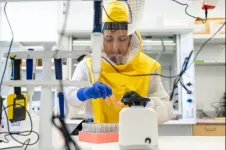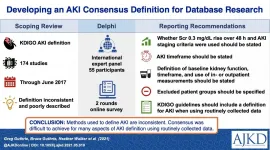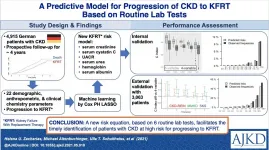They not only developed a test in-house that avoided the reagent supply shortages that hampered testing efforts nationwide, but also used 3D-engineered supplies and stable storage media, enabling samples to be transported to rural sites in Virginia without the need for constant refrigeration.
This novel protocol for transforming a research laboratory into a testing operation capable of processing more than 130,000 tests for the Commonwealth of Virginia and Virginia Tech communities since April 2020, has been described in a new article published July 20 in Nature Communications.
Carla Finkielstein, associate professor at the Fralin Biomedical Research Institute at VTC and scientific director of the Virginia Tech Molecular Diagnostics Laboratory at the Fralin Biomedical Research Institute, is the paper's corresponding author.
Since testing began, the Molecular Diagnostics Lab has analyzed samples from eight health districts across Southwest Virginia and more than 650 businesses, nursing homes, medical and dental offices, construction sites, and schools.
"This publication in Nature Communications provides an overview of the enormous dedication of the people, including Dr. Finkielstein and her colleagues, and the successful enterprise they have implemented in service of not only Virginia Tech, but also the entire community," said Michael Friedlander, executive director of the Fralin Biomedical Research Institute, Virginia Tech's vice president of health sciences and technology, and an author of the paper. "The partnership by Virginia Tech faculty, staff, students, and university leadership working closely with our health department leaders to meet the scientific, regulatory, legal, financial, and infrastructural needs to implement this program represents the Virginia Tech spirit of Ut Prosim at its finest."
At Virginia Tech, Finkielstein, who is also an associate professor of biological sciences in the College of Science, helped lead scientists across the university to develop a new test. An award-winning cancer researcher, Finkielstein shifted her attention from her laboratory and enlisted "a small army of volunteers" at the Fralin Biomedical Research Institute to work around the clock to develop a reliable RT-qPCR-based assay that could be validated and submitted to the Food and Drug Administration (FDA) for Emergency Use Authorization consideration, while avoiding the flawed tests kits and potential reagent supply chain challenges on the horizon for the nation, Friedlander said.
The Virginia Tech COVID-19 Lab launched on April 20, 2020, after submitting its application for an FDA-issued Emergency Use Authorization and receiving permission to begin testing. The initiative has helped expand public health lab testing capacity in Southwest Virginia -- a critical step to monitor the spread of the virus in the commonwealth and slow the pandemic.
The Virginia Tech Board of Visitors has since bestowed Finkielstein with its highest honor for faculty -- the Ut Prosim Scholar Award - for her service to humanity and her work to improve COVID-19 testing efficiency and effectiveness in support of Virginia Tech and the Virginia Department of Health.
"Dozens of dedicated, caring people contributed -- it is always more than just one individual effort," said Finkielstein, who is also affiliated with the Fralin Life Sciences Institute. "I am grateful to work with people who cared and stepped forward when they were needed. It is an honor to see the teamwork making contributions to people's lives."
Virginia Tech sits at the edge of Southwest Virginia, a rural section of the state that includes some counties with economic challenges. The region's population is older and lags the rest of Virginia in income and access to health care, according to U.S. Census data, making it especially vulnerable to COVID-19.
Paige Bordwine, Southwest Virginia's regional epidemiologist in the Virginia Department of Health's Office of Epidemiology, and Noelle Bissell, director of the New River Health District, who worked closely with the Virginia Tech team in validating and implementing the testing, are co-authors of the paper.
The Virginia Tech team developed a testing assay that in many cases is more sensitive and specific to SARS-CoV-2 than other available molecular tests. While most other tests target one or two regions of the same gene to identify the virus, the Virginia Tech test targets three, making it more accurate and bolstering its ability to detect virus variants. The test can analyze a variety of clinical sample types, including nasopharyngeal, nasal and throat swabs, and saliva.
To guard against errors, the Molecular Diagnostics Laboratory, located in the Fralin Biomedical Research Institute's new research building in Roanoke, was designed with physically segregated processing stations, controls to flag sources of contamination, monitors for human error, and strict criteria for reporting a sample as positive.
Because the test was developed in-house, scientists can rapidly adapt it to detect new mutations in the virus' genome and variants of the virus and implement it within hours, which enables a quicker assessment and public health response to virus mutations. The laboratory has the capacity to process 7,500 tests per week.
Deborah Birx, former White House coronavirus response coordinator, praised Virginia Tech's work to develop its own coronavirus testing site and open its campuses amid the global pandemic. In September, she told university officials that only a handful of universities nationwide are doing their own COVID-19 testing.
On Nov. 10, 2020, state officials announced Virginia Tech's COVID-19 lab was selected as one of three exclusive OneLab Network Tier 2 laboratories to expand virus testing capacity across Virginia. The lab is called upon to receive samples from any health district in the state, depending on the greatest need.
The paper's first authors are Alessandro Ceci, an analyst in the Molecular Diagnostics Lab at the Fralin Biomedical Research Institute; and Carmen Muñoz-Ballester, postdoctoral associate in the lab of Stefanie Robel, assistant professor at the Fralin Biomedical Research Institute.
Other authors include Friedlander; Allison Tegge, research assistant professor of statistics in Virginia Tech's College of Science; F. Marc Michel, associate professor of geosciences in Virginia Tech's College of Science; Harald Sontheimer, a former professor at the Fralin Biomedical Research Institute; Robyn Umans, a former postdoctoral associate in Sontheimer's lab at the Fralin Biomedical Research Institute; Dipankumar Patel, a former research scientist at the Fralin Biomedical Research Institute; Tewari, a former research assistant professor at the Fralin Biomedical Research Institute; Oscar Alcoreza, a former graduate research assistant in Sontheimer's lab at the Fralin Biomedical Research Institute; and Thomas Maynard, a research associate professor in the lab of Anthony-Samuel LaMantia, professor at the Fralin Biomedical Research Institute; and Daniel Martinez-Martinez, postdoctoral research scientist at the MRC London Institute of Medical Sciences.
The paper serves as a blueprint that could help research institutions act swiftly to ramp up viral testing protocols, navigate regulatory requirements, and support testing in rural communities - in the event of another global pandemic.
"By openly sharing our experience in developing and implementing a diagnostic test born from the necessity of our community, we hope to inspire other academic laboratories to overcome obstacles and provide assistance to their communities if challenges from infectious diseases arise in the future," Finkielstein said.
INFORMATION:
By Matt Chittum



